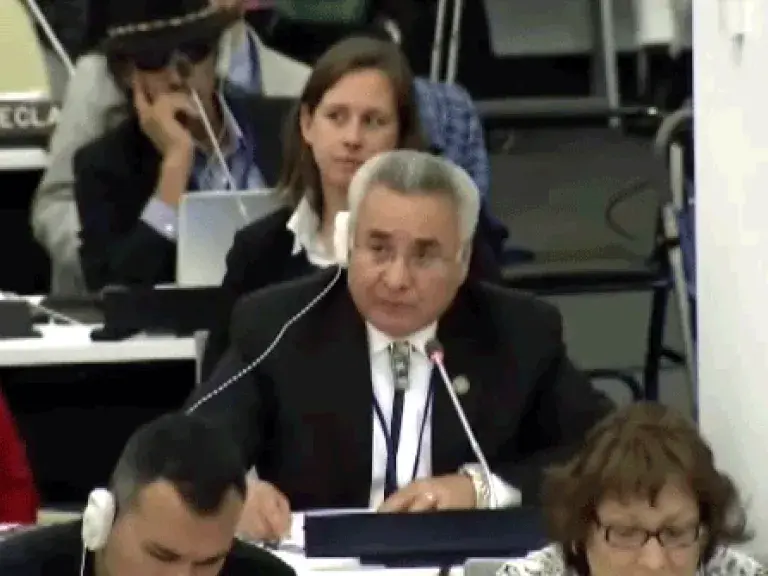
Statement on Behalf of 96 Indigenous Nations and 20 Indian Organizations
(May 19, 2014)
UN Permanent Forum on Indigenous Issues 13th Session
Agenda Item 6: Discussion on the World Conference on Indigenous Peoples
By the Cherokee Nation, MOWA Band of Choctaw Indians, Citizen Potawatomi Nation, Tonawanda Seneca Nation, Mille Lacs Band of Ojibwe, Yurok Tribe, Jamestown S’Klallam Tribe, Sisseton Wahpeton Oyate, Ewiiaapaayp Band of Kumeyaay Indians, Soboba Band of Luiseno Indians, La Jolla Band of Luiseno Indians, Karuk Tribe, Central Council of Tlingit and Haida Indian Tribes of Alaska, the Yupiit Nation, Akiak Native Community, Tetlin Village Council, Anvik Tribal Council, the Confederation of Sovereign Nanticoke-Lenape Tribes (including Nanticoke Lenni-Lenape Tribal Nation, Lenape Indian Tribe of Delaware, and the Nanticoke Indian Tribe of Delaware), Hoopa Valley Tribe, Quinault Nation, Mashantucket Pequot Tribal Nation, Nez Perce Tribe, Shoalwater Bay Tribe, the Federation of Native Communities of Ucayali (Peru), the National Congress of American Indians, California Association of Tribal Governments (32 Tribes), United South and Eastern Tribes (26 Tribes), the Native American Rights Fund, the Indian Law Resource Center, Americans for Indian Opportunity, the Self-Governance Communication and Education Tribal Consortium, Amazon School for Human Rights, Regional Organization of the Interethnic Association for the Development of the Peruvian Rainforest in Ucayali, Native Women’s Society of the Great Plains, Women Spirit Coalition, Alliance of Tribal Coalitions to End Violence, Southwest Indigenous Women’s Coalition, Yupik Women’s Coalition, Emmonak Women’s Shelter, Strong Hearted Native Women’s Coalition, the Kene Me-Wu Family Healing Center, the National Native American AIDS Prevention Center, Papa Ola Lokahi, and the Native Hawaiian Health Board.
This statement is made by 96 indigenous nations located in the Americas and acting through their own governments. Also joining in this statement are 20 indigenous organizations and coalitions.
Seven years have passed since the General Assembly adopted the UN Declaration on the Rights of Indigenous Peoples. Yet the Declaration is still having little impact on curbing the violations of indigenous peoples’ human rights, which continue to occur worldwide. Indigenous peoples are being displaced from their lands and resources by mega-projects and extractive industries; indigenous women are still subjected to the worst forms and rates of violence with no access to justice; indigenous lands and sacred places continue to be taken and desecrated with little regard for indigenous rights. Today, no country in the world openly opposes the UN
Declaration; yet, its words ring hollow when so little has been done by the United Nations or states to enforce its principles.
The World Conference on Indigenous Peoples presents an historic opportunity that indigenous peoples, their governments and representatives, have seized upon to gain permanent and lasting measures that will do more to achieve the purposes of the UN Declaration. We wish to see the Conference take place in September 2014. We are not interested in seeing the Conference postponed or canceled. Indigenous peoples cannot wait to achieve the promotion and protection of their rights. The process for taking action, however, must be open, transparent, democratic, and inclusive of all indigenous peoples’ voices.
Indigenous peoples, their governments and representatives, wish to see the United Nations take concrete and permanent measures that will at last provide meaningful improvements in the lives of indigenous peoples worldwide. The General Assembly has adopted the Declaration, but real and sustained action to achieve its objectives is what is needed now.
We therefore call on the United Nations to take action at the World Conference on Indigenous Peoples by adopting several decisions.
First, we recommend that the United Nations establish a body with the authority to promote compliance and monitor implementation of the Declaration on the Rights of Indigenous Peoples. Such a body must be empowered to receive relevant information, share best practices, make recommendations, and to work toward the objectives of the Declaration. The body should be made up of experts, including indigenous experts. Such a body would do more than anything to achieve the objectives of the Declaration and to promote compliance with the Declaration.
Second, we recommend that the United Nations take three steps to address the epidemic of violence against indigenous women: (i) convene a high-level conference to examine challenges to the safety and well-being of indigenous women and children and to share perspectives and best practices on the realization of the rights of indigenous women and children under the UN Declaration; (ii) require that the UN body for monitoring and implementing the Declaration give particular attention to the issue; and (iii) appoint a Special Rapporteur to focus on human rights issues of indigenous women and children, including violence against women and children and on changing state laws that discriminate against them.
Third, we recommend that the United Nations take priority action at the earliest possible time to protect indigenous peoples’ rights to their religious and cultural sites. We specifically recommend that the World Conference request the Office of the High Commissioner for Human Rights, the Human Rights Council, the Expert Mechanism on the Rights of Indigenous Peoples, the Special Rapporteur on the Rights of Indigenous Peoples, the UN Educational, Scientific and Cultural Organization, and the Permanent Forum on Indigenous Issues to gather and share relevant information and best practices from states and indigenous peoples, conduct expert meetings and interactive panels, prepare studies, issue reports, and make concrete recommendations for the implementation of indigenous peoples’ right to maintain, protect, and have access in privacy to their religious and cultural sites and to manifest, practice, develop and teach their spiritual and religious traditions, customs and ceremonies. The recommended implementing and monitoring mechanism for the UN Declaration, when it is created, should also give priority attention to the protection of indigenous peoples’ religious and cultural sites.
Finally, we recommend that the United Nations take action to provide indigenous peoples and their representatives, especially their constitutional and customary governments, a distinct status for participating in UN meetings, processes, and events — a permanent and appropriate status that reflects their character as peoples and their authority as governments, so that they do not have to call themselves NGOs or speak through civil society organizations. The practice of impairing or silencing by omission the voices of indigenous peoples, their governments and representatives, is not democratic and is inconsistent with the objectives of the UN Declaration. The direct participation of indigenous governments and peoples is a real benefit to the UN, and their participation should be facilitated.
Some of these recommendations have already been studied by the UN system and their objectives have been supported by the Permanent Forum itself. The recommendations enjoy broad support from indigenous peoples, their governments and representatives, from several regions, particularly in North, Central, and South America, as reflected in resolutions of the National Congress of American Indians in the United States and the Assembly of First Nations in Canada.
Development of the details of these recommendations should, of course, have the full participation of indigenous peoples, their representatives and governments. We wish to see the full and inclusive participation of indigenous peoples, their representatives and governments, in developing and helping to implement the decisions of the World Conference. We have already begun conversations with states about these recommendations, and we look forward to discussing them fully with as many state delegations and UN bodies as possible. Decisions by the World Conference that are in keeping with these recommendations will certainly achieve many of the objectives of the UN Declaration and ensure a productive and successful outcome of the World Conference.
The full text of our recommendations is available online at indianlaw.org. We also have copies available in the room.
Statement in English
Declaración - Español
Implementing the UN Declaration on the Rights of Indigenous Peoples: Creating a UN Mechanism for Monitoring and Promotion
Recommendations for Combating Violence Against Indigenous Women
Joint Statement regarding Combating Violence Against Indigenous Women
Recommendations for regularizing indigenous participation in the United Nations
Recommendation for Action by the World Conference to Protect Indigenous Peoples’ Sacred and Cultural Places
